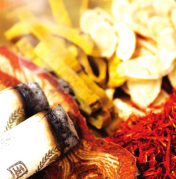 |
| Use of medicinal herbs is one of the key elements of China's ancient medical system. |
Good medicine?
In some ways, TCM is enjoying a renaissance. The number of its practitioners continues to spike, acupuncture remains trendy, and Chinese lawmakers recently called for its more widespread use in controlling infectious diseases like SARS and Avian Influenza.
Citing government statistics, Xinhua reported recently that H7N9-virus patients had a mortality rate of 9.1 percent if treated with a combination of TCM and Western methods. This rate deteriorated to 30 percent for those depending solely on the latter.
More positive PR came from Tu Youyou, a scientist from Zhejiang province. In 2011 she was awarded for her work in isolating artemisinin decades earlier from sweet wormwood, a popular Chinese medicinal herb. This compound later became the key ingredient in the world's leading anti-malaria drug.
Despite these achievements, Fruehauf says it is debatable whether TCM is enjoying a new golden age.
"If you ask the Chinese government and the American Association of Chinese Medicine, they think it's on the rise. It's getting better every day," he says.
"But while we probably have more licensed Chinese medicine practitioners in China, as well as in the West, than ever before, the quality of those people is lower than ever before. So that's what I'm worried about."
Part of the problem stems from a brain drain as talented students chase more lucrative jobs in the legal professions or in big corporations, and part of it is cultural.
"It's a reality that (the vast majority) of students at a Chinese medicine school, in China especially, don't want to be there. They just didn't pass the exam for the regular medicine school. So, right from the get-go, they're not that interested," he says. "Most of them, five years later, make their money from prescribing antibiotics and other Western medicines."
